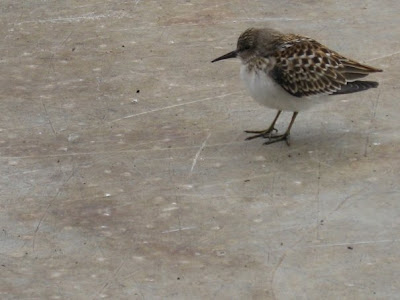 |
| Mallard Duckling, Skaha Lake, Penticton. Photo by M. Wilson |
So you want to try birding (that's bird watching, not bird hunting). Here's what you'll need to get started:
- Binoculars (optional)
- Bird identification book (optional)
- An area where you can find birds (includes your backyard)
Pretty easy huh?
Birding is a great hobby for all ages. It's free to do, and you can
find birds anywhere in the world. With over 400 species of birds in
Canada alone, it's a hobby that's always evolving and will keep you
entertained for years to come, especially if you like to travel (for
example, Brazil has over 1800 bird species, 234 of which are endemic,
meaning they live there and nowhere else in the world).
As far as our
Stewards of the Strait pledges are concerned, Bright Birders are in short supply. Which I find strange, because I'm
sure that almost every person in British Columbia has at one point
gone birding, though perhaps unknowingly. Did you see that American
Robin digging for worms in your lawn? How about that Red-tailed Hawk
soaring high above your office? You just went birding.
Congratulations!
Now as a Bright Birder,
there are some very important guidelines that we here at the Georgia Strait Alliance recommend you follow while you're viewing the
birds. These guidelines will ensure that you not only keep the
wildlife as safe and calm as possible, but it will also maximize your
enjoyment of the hobby. There's nothing worse than getting too close
to a bird and scaring it away before you have time to identify it, am
I right?
 |
| Great Blue Heron, Stories Beach, Port Hardy. Photo by M. Wilson |
- Observe and photograph birds without knowingly disturbing them in any significant way. Avoid chasing or repeatedly flushing birds.
- Not only will this keep the birds safe, but it will ensure you enjoy the birds' natural behaviours for as long as possible.
- Only sparingly use recordings and similar methods of attracting birds and don't use these methods in heavily birded areas.
- This one is very important. Birds use their calls to attract mates and guard their territories. If you use recorded bird calls to attract birds to you, not only are you likely stressing them out, but you could be doing them genuine harm (you may cause them to lose mates or territory, and no one wants to do that!).
- Keep an appropriate distance from nests and nesting colonies so as not to disturb the birds or expose them to danger.
- Obviously, any mother with a giant intruder near her babies will not be impressed. Don't scare mum!
- Refrain from handling birds or eggs unless engaged in recognized research activities.
- Don't touch anything! Besides, birds are famous for carrying lots of diseases, mites, and ticks. If you do touch a bird, clean your hands thoroughly afterwards.
- Stay on existing roads, trails and pathways whenever possible to avoid trampling or otherwise disturbing the fragile habitat.
- This will keep the entire ecosystem safe and pristine. The birds will thank you!
- Leave all habitats as they were found.
- This rule applies to all recreational outdoor activities. If you stop for a picnic, make sure you bring EVERYTHING back with you. This includes everything from sandwich bags to cigarette butts. And except for maybe the occasional feather, don't bring anything back with you, no matter how beautiful that empty bird's nest is.
 |
| Unidentified Sandpiper, Fishing boat off Ucluelet. Photo by M. Wilson |
So
there you are, you are now ready to go out and discover the amazing
and diverse world of birds. Please stop by our Stewards of the Strait website and sign our Bright Birder pledge. This
will ensure that we here at the Georgia Strait Alliance know
that there are people out there who care for the well-being of these
amazing animals. While you're there, sign a few of our other pledges
as well, I'm sure there's at least one that applies to you!
Enjoy your new hobby!
- Mikaela


No comments:
Post a Comment